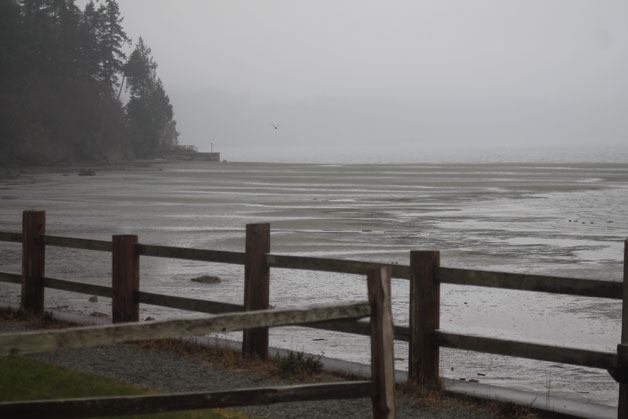Langley is seeking to protect one of its natural draws and a major tourism element: gray whale migration.
Sand shrimp, also called ghost shrimp, are at risk by commercial harvesters, say members of the Langley Shrimp Advisory Committee. Water jets that disrupt tidelands and expose the shrimp leave the grounds altered in such a way, shrimp advocacy members say, that the whales are not visiting Langley as frequently as in years past.
“Whales have a good memory,” said Mayor Fred McCarthy, who assembled the 17-member committee. “When they come somewhere and there’s no food, they won’t come back next year.”
McCarthy said the city has asked the Washington State Department of Natural Resources, the state agency that manages tidelands and aquatics resources, for a two-year moratorium on sand shrimp harvesting along Saratoga Passage and in front of Langley. He acknowledged that it may impact the commercial harvesters —sand shrimp are sold for bait — but said there were plenty of other places around Puget Sound to collect sand shrimp where nearby communities don’t depend on whales for tourism.
“Our whole goal is not to stop that whole fishery,” McCarthy said. “We as a city — opening a whale center and Whale Bell Park, having the whale parade — our whole identity is tied to the visits by the whales. If we don’t act proactively to maintain their feeding grounds, we fear there may not be as many coming on their migratory trips and stopping here.”
Attempts to learn the identities of the shrimp harvesters from the city were unsuccessful.
Langley’s shrimp committee includes whale advocacy heavyweights Howard Garrett and Susan Berta, founders of Orca Network, and Fred Lundahl, a business owner and founder of the future Langley Whale Center. Garrett said he has not noticed a decline in whale visits, but he said whale visits are not monitored — it’s done mainly by whale watching tours and reports to Orca Network.
“It’s pretty much the same each year,” Garrett said. About 10 gray whales migrate through Saratoga Passage every year as early as late January and as late as early March.
Cruising through the sediment rich waters of Puget Sound, gray whales predominantly feast on sand shrimp which burrow into tidelands. The whales take massive scoops of the silty bottom, then filter out the sand and keep the shrimp. Near Langley, gray whales have been seen close to shore where the shelf drops dramatically. It is a scene immortalized in the main promotional photo of the Langley Whale Center, by Jill Hein, an Orca Network member, of a gray whale spyhopping mere yards away from people on the beach near Sandy Point.
“They’re here specifically for a very localized but very dense population of these shrimp,” Garrett said, adding that over 50 percent of the gray whale diet through Puget Sound is sand shrimp.
A fight for the sand shrimp beds took a dire turn when one resident informed the committee that stakes were placed around one tideland area known to attract whales. The stakes would keep out the whales, which could not navigate through them or above them. McCarthy said a call was made to the Washington Department of Fish and Wildlife, which told the shrimper to remove the stakes.
“That was the most egregious offense we heard of,” McCarthy said.
Langley submitted its moratorium request Feb. 10 and had not heard back from the Department of Natural Resources.
The state’s role in the city’s request was unclear. Commercial sand shrimp harvest permits are issued by the Washington Department of Fish and Wildlife. Toni Droscher, a spokeswoman from the Department of Natural Resources, said the agency issues rights of entry to state-owned tidelands that last five years. Only five rights of entry are issued on both sides of Saratoga Passage, and each entry is between 1,000 linear feet and 2,000 linear feet. DNR is a land manager, which includes state-owned aquatic lands.
“We do have a mandate to allow for certain uses of public benefit,” she said. “We also have to ensure that this resource will exist for future generations.”
It is possible that a private tideland owner leases their aquatic property to commercial harvesters. However, if the state issued a two-year moratorium on sand shrimp harvesting in Saratoga Passage, that would negate both the right of entry and the commercial permit. Langley’s mayor said the aim was not to put the commercial shrimpers — one of whom lives on South Whidbey and one on Camano Island, he said — out of business, but to relocate their work.
“We think there’s plenty of other places to harvest these shrimp,” McCarthy said. It might not be as convenient as coming to Langley to get it. But other places aren’t counting on the whales coming for a tourist attraction and a city identity.”
The shrimp advisory committee sent a handful of studies on the impact of water jets to sand shrimp beds and gray whales to the Department of Natural Resources to aid its review of the city’s request.



